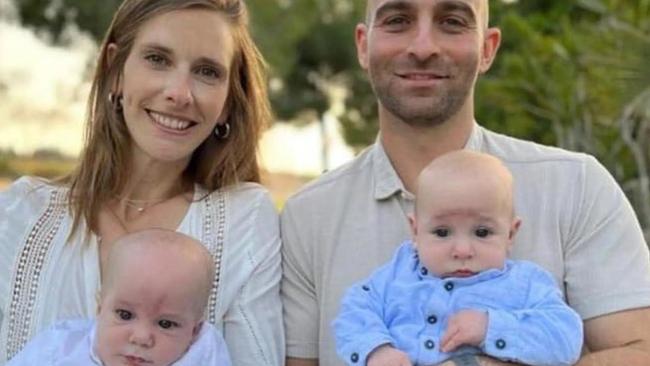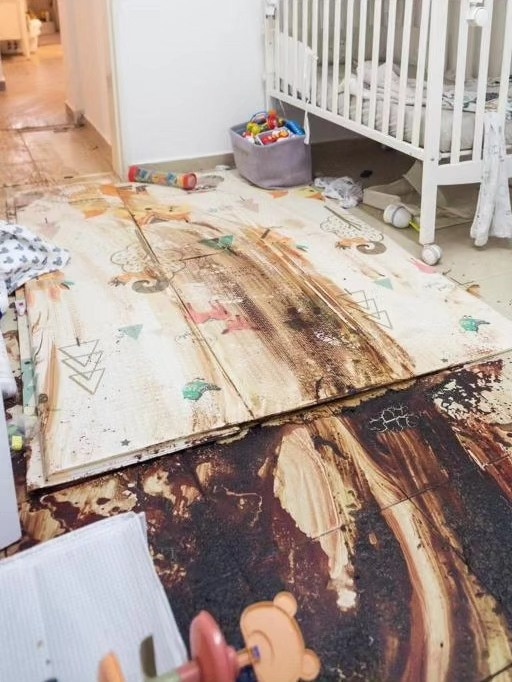How Israeli parents Itai and Hadar Berdichevsky saved twin boys from slaughter
With Hamas terrorists inside his home, Itai Berdichevsky’s final, desperate act was to scoop up his 10-month-old twins and hide them in a closet.

Itai Berdichevsky knew Hamas terrorists were inside his home in Kfar Aza on the morning of October 7. Defenceless against their grenades and heavy weaponry, his final, desperate act was to scoop up his 10-month-old twins and hide them in a closet.
The bodies of Itai and his wife, Hadar, recently married were later found by Israeli special forces as they fought house by house to liberate the village. Hadar had rushed to the kitchen to fetch baby bottles when terrorists burst inside, killing her and then storming the bedroom where Itai had been waiting.
Somehow, their orphaned children survived over the next 14 hours of carnage, neighbours hearing the crying as they went without food or water. It’s an acutely distressing account that emerged during an interview published in The Australian on Friday with Major G, an elite combat medic attached to Unit 669 of the Israel Defence Force.
Major G was in the midst of treating survivors in Kfar Aza when a soldier emerged from a car holding the twins, moments after they were saved. Only later would the medic understand how their lives had been saved by the slimmest of probabilities.
October 7, the blackest day in Israel’s history, ended with a slew of massacres led by Hamas terrorists across southern Israel, with the atrocities at Kfar Aza ranking among the very worst.
This peaceful farming community a short drive from the border is where Gazans with work approvals would arrive daily to pick vegetables in the fields, or conduct repairs and maintenance, earning salaries far higher than they ever could in the corrupt, dysfunctional towns in the Hamas-controlled territory.
Relations were perfectly amicable with these Palestinians, said former residents of Kfar Aza, now recovering in the centre of Israel, in hotels further afield from the rocket attacks still being fired from civilian infrastructure inside Gaza.
Over years there had been a trust, a rapport, built with these people, they said. And while not yet confirmed, it’s openly stated some of these workers supplied intelligence to Hamas to help carry out their attacks with precision.
The Australian has twice visited the ruins of Kfar Aza, including this week, when former British prime minister Boris Johnson inspected the wreckage and asked an Israel Defence Forces guide if the terrorists had been assisted by the Palestinian workers who’d crossed the border each day.

“That is still under review,” said IDF major Liad Diamond. “That is something we’re still investigating.” But standing next to Major Diamond was Israel’s former envoy to the UN, Danny Danon, who shook his head and interrupted the response, insisting that Major Diamond’s answer was far too diplomatic.
Mr Danon said it was plain the terrorists were armed with inside knowledge from those workers.
“We found the maps with the names of families of the kibbutzim,” he said. “And more than that – they (Hamas) knew who is in charge of the security, who has a gun, who has a dog. They marked everything. They planned it for a long time – they knew where to go and what to do.”
Slivers of detail have emerged of the Berdichevskys’ final moments. One of Hadar’s brothers, Inbar Rosenfeld, has spoken of receiving a text message on the family group chat, his sister joking about being stuck in a bomb shelter with twins. That was the last they heard from her.
Another brother, Dvir, said Hadar was found in the kitchen, baby bottles all over the floor, suggesting she had left the shelter to collect vessels for feeding, with Itai in the safe room almost certain to have heard the terrorists coming towards him and the kids.
Few in Israel are unfamiliar with their story, and donations have poured in for the babies, now in the care of relatives. As Mr Rosenfeld noted on Facebook, it’s a story that had touched so many people, beyond a level the couple could have ever understood.
“And that was before they met and fell in love with you!” he wrote. But he would be glad, he said, to have that recognition erased, and to have the world returned as it was before October 7, to “go back to our quiet corner”.




To join the conversation, please log in. Don't have an account? Register
Join the conversation, you are commenting as Logout